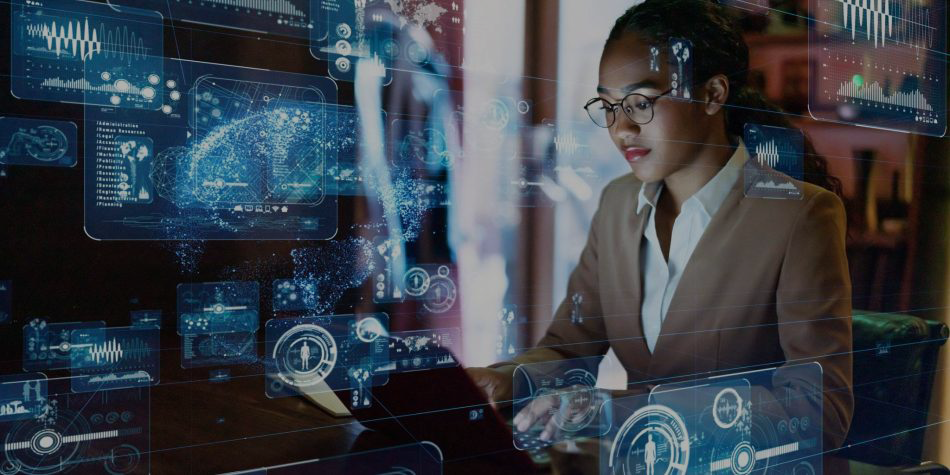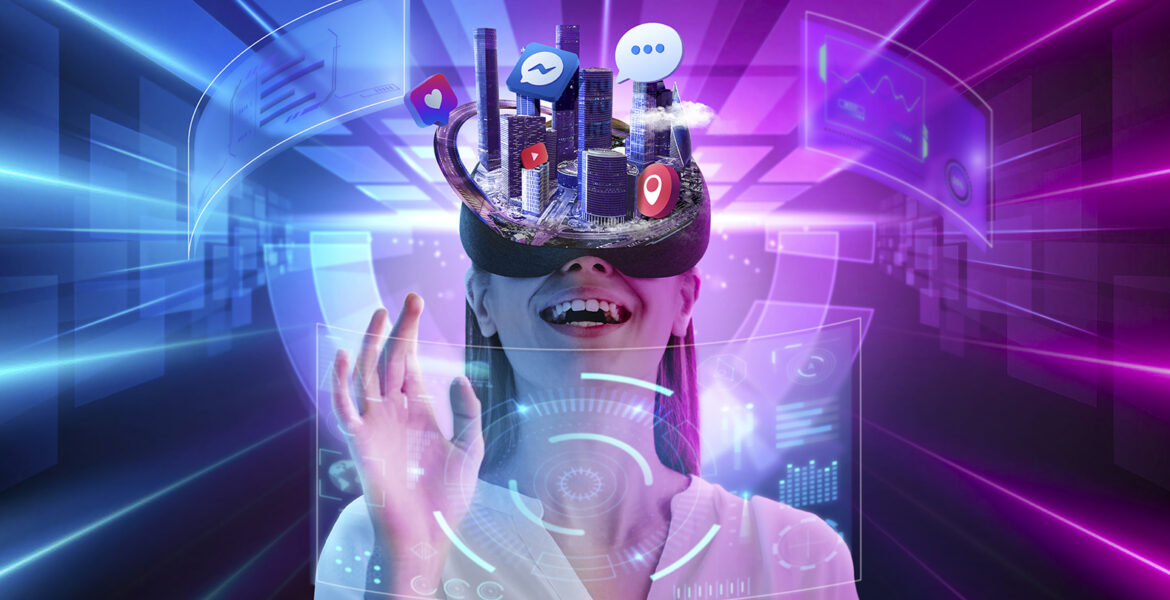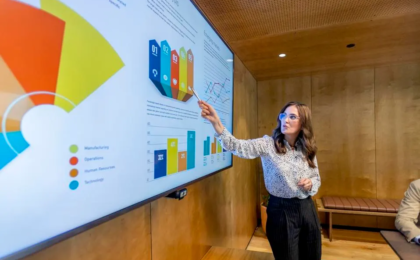Future Prediction For Artificial Intelligence, more commonly referred to as AI, is an innovative field that aims to create machine intelligence capable of performing tasks that typically require human or natural cognitive function. These tasks include but are not limited to learning, reasoning, problem-solving, natural language processing, and intractability with external stimuli for non-linear decision-making. Additionally, AI systems mimic human cognitive capacities, allowing them to process enormous volumes of data, spot patterns, and make decisions with an increased level of autonomy. The ultimate goal of AI is to reach a level of advancement where it is equal to or greater than base human intelligence.
There are various subfields under the AI umbrella. The recent explosion of AI-based tools is changing the way various fields work. The broad categories that are given below each focus on different aspects of intelligence:
Machine Learning: It focuses on machines learning from data without being explicitly programmed. It involves algorithms that improve performance over time by recognizing patterns and adjusting the system’s behavior accordingly.
Natural Language Processing (NLP): NLP gives computers the ability to comprehend, decipher, and create human language. It serves as the foundation for programs like chatbots, language translation, and speech recognition.
Computer Vision: The ability to analyze and comprehend visual data from films and photographs is made possible through computer vision. Facial recognition, object detection, and autonomous cars are all areas where this technology is applied.
Robotics: Robotics with AI makes it possible for machines to function autonomously and interact with the real world. Manufacturing, healthcare, and exploration are just a few industries where AI robots could potentially and are currently being utilized.
Expert Systems: Expert systems are AI programs designed to mimic the decision-making capabilities of human experts in specific domains. They use rules and knowledge databases to solve complex problems.
Historical Perspective on AI
The historical perspective on artificial intelligence (AI) is a fascinating journey of innovation spanning several decades. Significant advancements and transformative breakthroughs mark these intervening years. A brief look at the key milestones in the development of AI is shared below:
Early Concepts (1950s-1960s):
The phrase “artificial intelligence” was first used in the 1950s, which is when AI began to take shape. Alan Turing and John McCarthy, pioneers in AI theory, devised the Turing Test as a way to gauge a machine’s capacity for human-like intelligence. During this period, researchers explored symbolic AI, using formal logic to create reasoning systems.
AI’s Early Challenges (1970s):
The constraints of processing power and the increasing understanding of the complexity of human intellect were substantial obstacles for AI in the 1970s. An “AI winter,” in which funding and interest in AI research diminished, resulted as the excitement and progress became slower.
Expert Systems (1980s):
In the 1980s, expert systems gained popularity. These AI programs imitated human expertise in specific domains, relying on extensive sets of rules and knowledge bases. While successful in certain applications, expert systems were limited in handling uncertainty and lacked the ability to learn from data.
Rise of Machine Learning (1990s-2000s):
The focus of AI shifted towards machine learning, which allowed systems to improve their performance through experience. Algorithms like neural networks, support vector machines, and decision trees saw significant advancements. However, practical applications of AI were still somewhat constrained due to data availability and computational resources.
Big Data and Deep Learning (2010s):
The proliferation of big data and more powerful computers set the stage for a remarkable resurgence of AI in the 2010s. Deep learning, a branch of machine learning, has made revolutionary strides in the fields of speech and image identification, and natural language processing, among other areas. Neural networks with multiple layers proved to be highly effective in learning complex patterns from vast amounts of data.
AI in Everyday Life (2010s-2020s):
During this period, AI started permeating everyday life, becoming an integral part of various industries. AI-driven technologies are now used in virtual assistants, recommendation systems, autonomous vehicles, medical diagnosis, finance, and many other sectors, revolutionizing the way we live and work.
Ethical and Societal Considerations (2020s):
As AI becomes more ubiquitous, concerns about its ethical implications and potential societal impact have come to the forefront. Discussions on data privacy, bias in algorithms, job displacement, and AI safety have gained significant attention.
Advancements in AI Research (2020s):
AI research has continued to progress rapidly, with innovations in reinforcement learning and generative models, among others. AI systems have achieved remarkable feats, such as defeating human champions in complex games like Go and Poker.
Towards AGI (Artificial General Intelligence):
The goal of Artificial General Intelligence, or AI systems that are capable of carrying out intellectual work that a person is capable of, continues to be an ambitious and difficult objective. Researchers and experts continue to explore the path to AGI while emphasizing the importance of ethical considerations and safety measures.
The Current State of AI
At the moment, AI stands at the precipice of remarkable advancements. Currently, AI systems are capable of amazing actions, such as defeating human champions in challenging games like Go and Chess or providing customized buying recommendations based on user behavior. AI-powered virtual assistants have become household staples, simplifying daily tasks and improving user experiences.
The underlying technology driving these advancements is machine learning, a branch of artificial intelligence that enables algorithms to learn from data and enhance their performance over time. Deep learning, a specialized form of machine learning, has particularly catalyzed AI’s progress, making it adept at handling vast amounts of unstructured data, such as images, audio, and natural language.
Future Predictions of AI
AI-Based Personalization Revolutionizes User Experience
AI-driven personalization is set to reach new heights by 2025. As algorithms become more sophisticated, they will seamlessly understand individual user preferences and behavior, leading to highly tailored experiences across various platforms. Whether it’s content recommendations, product suggestions, or personalized health insights, AI will refine user interactions, driving higher engagement and customer satisfaction.
AI Predictions Become Incredibly Accurate
By 2025, AI’s predictive capabilities will advance significantly. With access to vast amounts of data and refined algorithms, AI systems will offer highly accurate forecasts in fields like finance, weather, and even medical diagnoses. Businesses will use AI-driven predictions to streamline supply chains, cut expenses, and make precise data-driven choices.
AI Augmentation Transforms the Workforce
The integration of AI into the workforce will reshape how people work. Rather than replacing human jobs, AI will augment human capabilities, enabling employees to focus on creative and strategic tasks while offloading repetitive and mundane activities to AI-powered automation. This augmentation will lead to a more efficient and productive workforce.
AI in Healthcare Revolutionizes Diagnosis and Treatment
AI’s presence in healthcare will be transformative in the next few years. Medical professionals will leverage AI-powered tools to improve disease detection, diagnosis, and treatment planning. AI algorithms will analyze medical records, genetic data, and diagnostic images to provide personalized treatment recommendations, leading to better patient outcomes and a more efficient healthcare system.
Ethical AI Regulations Gain Prominence
As AI becomes more pervasive, concerns about ethics and data privacy will intensify. By 2025, we can expect governments and regulatory bodies to establish more stringent guidelines for AI development and usage. To preserve public trust and reduce potential biases, it will be essential to ensure openness, fairness, and accountability in AI systems.
The Societal Impact of AI in 2025
Automation and Job Displacement
By 2025, AI is likely to have significantly impacted the job market. AI can open up new career prospects, but it can also automate a lot of mundane and repetitive activities, which could result in job displacement in some areas. The workforce will thus need to be retrained and upgraded in order to keep up with the evolving labor market.
Ethics and Regulation
Ethics will be at the center of conversations as AI becomes increasingly common in a variety of industries. To guarantee that AI is used fairly and responsibly, strong laws will be needed to address issues like bias in AI algorithms, privacy concerns, and decision-making openness.
Healthcare Advancements
AI is anticipated to transform healthcare by advancing diagnosis, medication discovery, and individualized treatment regimens. It may also enable better management of patient data and optimize hospital operations, leading to more efficient healthcare systems.
Education Transformation
AI-powered personalized learning platforms could become common in education, tailoring educational content to individual students’ needs. AI-driven assessments may also provide deeper insights into students’ strengths and weaknesses, facilitating targeted interventions and better learning outcomes.
Transportation and Autonomous Vehicles
The advent of self-driving cars and autonomous delivery systems could reshape transportation. By 2025, we may witness the early adoption of autonomous vehicles in some regions, leading to improved road safety and reduced congestion.
AI in Art and Creativity
AI-generated art, music, and literature might become more prevalent, raising questions about authorship and originality. The debate surrounding the use of AI in creative works could intensify, challenging conventional notions of human creativity.
Climate Change and Sustainability
AI applications could play a crucial role in addressing environmental challenges. From optimizing energy consumption to managing natural resources and predicting extreme weather events, AI may contribute significantly to sustainability efforts.
Social Interactions and Digital Divide
With the increased integration of AI into daily life, the digital divide might widen. Those without access to AI-driven technologies could face disadvantages in areas such as education, job opportunities, and information access.
Security and Cybersecurity
As AI becomes more sophisticated, it can be both a valuable tool for enhancing cybersecurity and a potential threat if misused by malicious actors. Moreover, AI-powered cyber-attacks and defenses may present new challenges for digital security.
AI in Governance and Politics
Governments may utilize AI in decision-making processes and public services, potentially improving efficiency and accountability. However, this could also raise concerns about transparency and bias in policy implementation.
It’s important to remember that these predictions are speculative, and the actual societal impact of AI in 2025 will depend on how technological advancements, ethical considerations, and policy choices unfold in the intervening years. However, responsible development and deployment of AI will be crucial in ensuring a positive and inclusive impact on society.
Mitigating the Challenges of AI
Mitigating the challenges of AI involves addressing potential risks and issues associated with the widespread adoption and deployment of artificial intelligence. Here are some key strategies to tackle these challenges:
Ethical AI Frameworks
Develop and implement robust ethical frameworks for AI development and deployment. To ensure that AI systems see proper usage, these frameworks should prioritize fairness, transparency, responsibility, and confidentiality.
Regulation and Policy
Governments and regulatory organizations should establish clear rules and legislation. This includes setting standards for data usage, preventing algorithmic bias, and defining liability in case of AI-related accidents or malfunctions.
Bias Mitigation
AI algorithms can inherit biases from the data available to them. To mitigate bias, it is essential to use diverse and representative datasets and employ techniques like adversarial testing and fairness-aware learning to ensure fairness in AI decision-making.
Explainable AI
Develop AI systems that provide understandable and interpretable explanations for their decisions. Explainable AI helps build trust in the technology and enables users to understand how AI arrives at particular outcomes.
Continuous Monitoring and Auditing
Regularly monitor AI systems to detect and rectify potential biases, errors, and security vulnerabilities. Conduct third-party audits to ensure compliance with ethical standards and regulations.
Human-AI Collaboration
Foster collaboration between AI systems and human experts. Encourage AI to augment human abilities rather than replace them, ensuring that human judgment and oversight remain crucial in critical decision-making processes.
Security and Privacy
Put strong security measures in place to shield AI systems from online dangers and illegal access. Additionally, safeguard user data and privacy by adhering to strict data protection regulations.
Responsible AI Research
Encourage and support research that aims to address the ethical, social, and safety aspects of AI. Collaboration between academics, businesses, and policymakers can aid in early detection of challenges.
Public Awareness and Education
Increase public knowledge of AI technology, its possible risks, and its capabilities. The public’s perceptions and expectations about AI can greatly change via the availability of relevant information.
Future Prediction For Artificial Intelligence Conclusion
The future of AI in 2025 is incredibly promising, with AI-based personalization, accurate predictions, and transformative societal impacts on the horizon. While challenges persist, adopting ethical practices, enhancing data privacy, and prioritizing lifelong learning will enable us to harness the full potential of AI while mitigating its potential downsides. Embracing AI’s potential responsibly will lead us to a future where AI seamlessly augments human capabilities and enhances our quality of life.

















[…] Artificial intelligence (AI) and machine learning (ML) have already transformed digital marketing, and I predict their role will become even more prominent, further optimizing everything from customer segmentation to content creation. […]